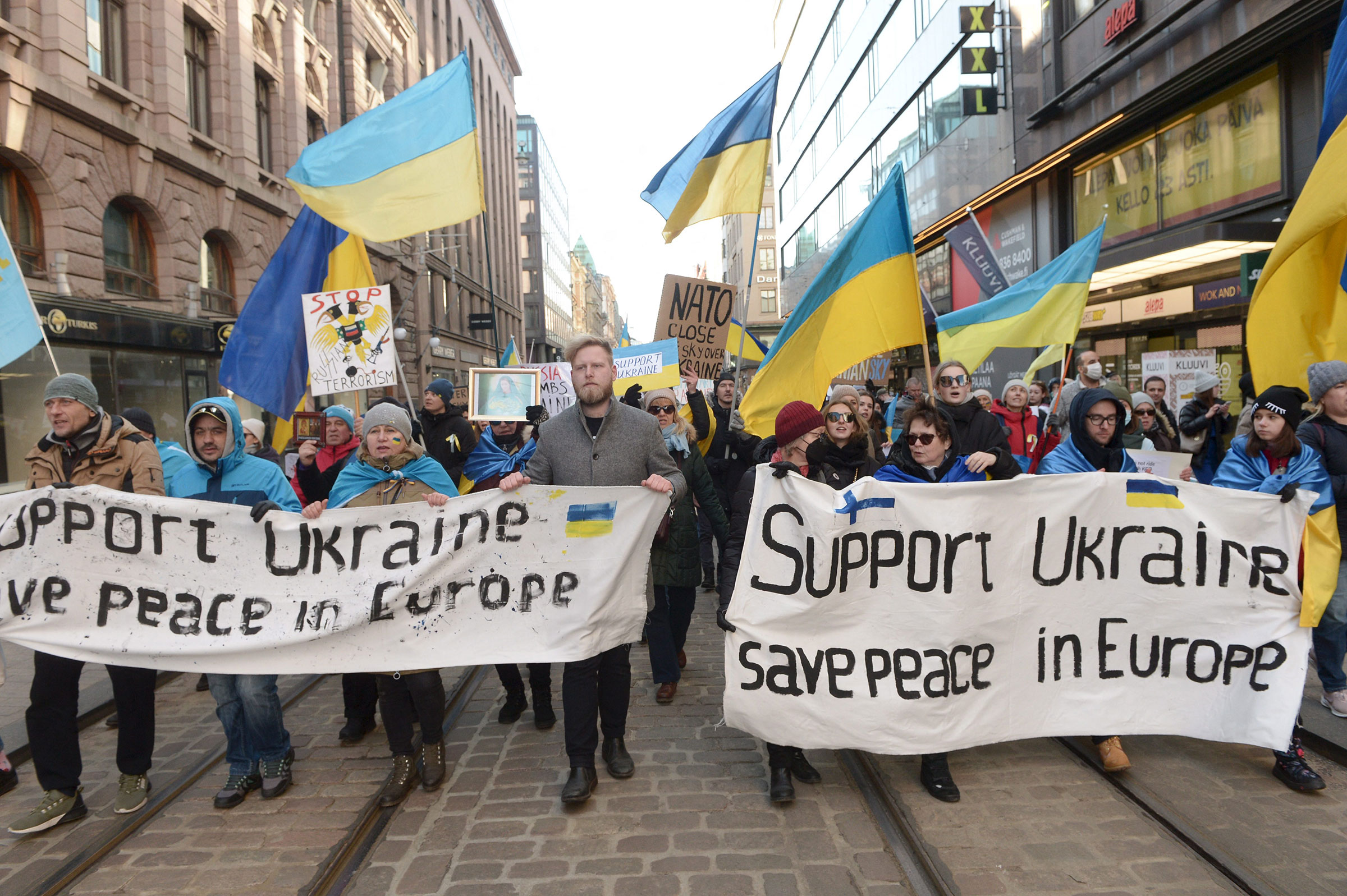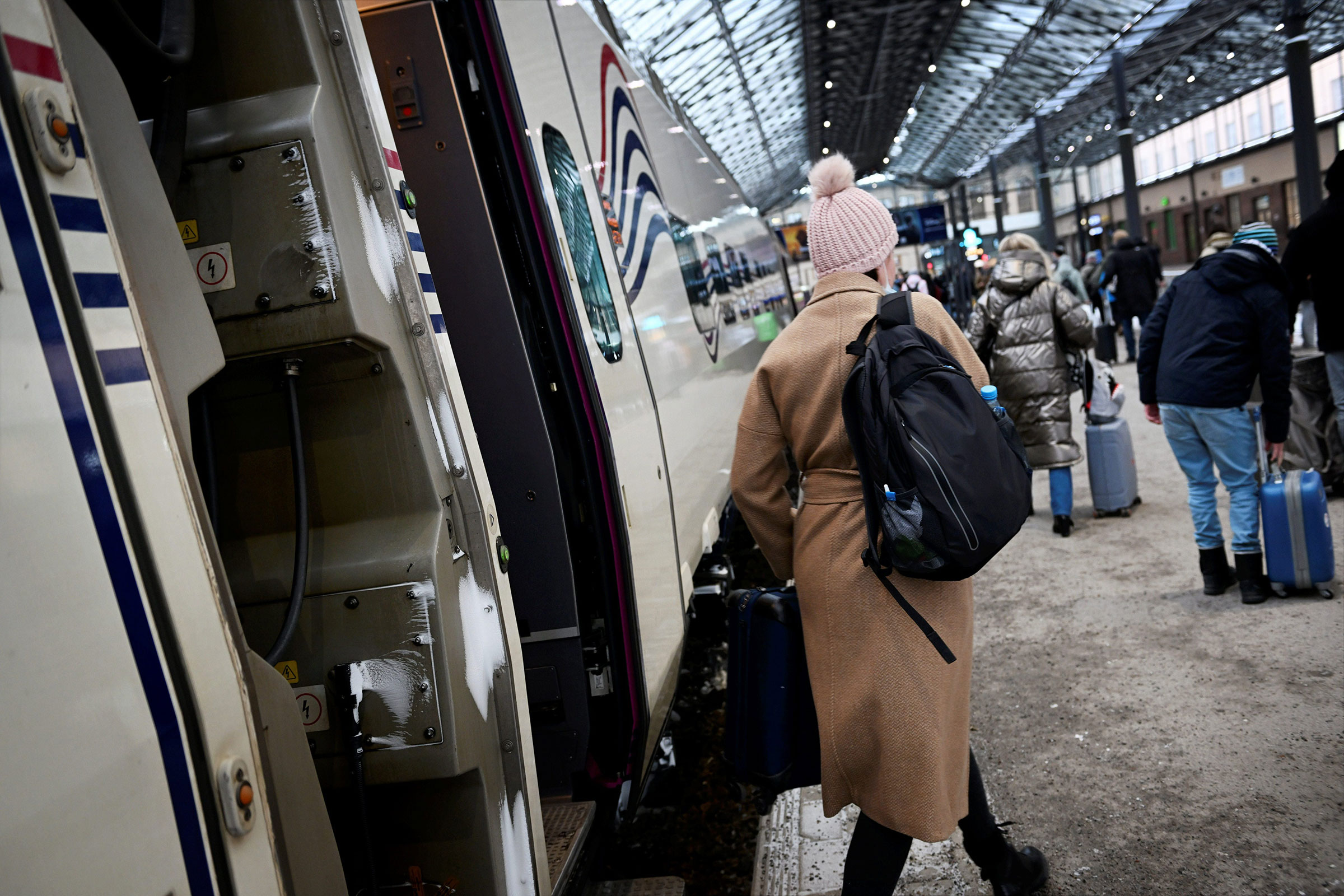On a recent Thursday evening, three protestors stood on Platform 9 of the Helsinki station, waiting to greet the train from Saint Petersburg. Draped in the Ukrainian flag, one held aloft a handwritten poster with the words Russia Kills Children. The others clutched photos of the devastation in Ukraine. When Alexandra, a university student leaving behind her life in Moscow, stepped from the train with her large, lavender suitcase, the protestors glared at her. “It’s so annoying,” Alexandra said. “I mean, I understand where they’re coming from. But don’t they know that we’re the ones whose friends are getting arrested for opposing the war?”
Like many on that train arriving in Helsinki, Alexandra was fleeing Russia. (None of the Russians who spoke to TIME were willing to give their last name, fearing reprisals from the Putin regime.) Since Ukraine was invaded on Feb. 24, the world’s attention has rightly been on the more than 3 million Ukrainians forced from their homes by the violence. But the war has also unleashed a smaller exodus to the north, as a crackdown on dissent, harsh economic sanctions, and a fear of potential martial law has convinced many Russians, especially among the segment of society there that does not support the war, that they should get out while they still can.
Read More: The World Is Watching Russia Invade Ukraine. But Russian Media Is Telling a Different Story
Their options are few. With more than 30 countries banning flights that originate in Russia from their airspace, the only options for reaching Europe are over land. A handful of buslines offer service to Finland or Estonia, but the Allegro train from Saint Petersburg to Helsinki, which currently runs twice a day and seats 350 passengers, is the only remaining option by rail. A few days after the war in Ukraine began, those trains began selling out.
“About 70% of the passengers are Russian,” says Viktoria Hurri, director of Finnish-Russian Passenger Services for VR, the Finnish railway company. “It’s very difficult for us to say whether they plan to stay [in the European Union]. But they are bringing a lot of luggage.”

What it takes to flee
Konstantin Sonin, a Russian economist at the University of Chicago, tweeted earlier this week that some 200,000 Russians have emigrated since the start of the war. At least 80,000 of them have gone to Armenia, according to the government there, and 25,000 of them are in Georgia. Turkey and Israel have also received large numbers. But a steady trickle is making its way to Finland and from there, to the rest of Europe, or even further west, including to the United States.
Due to COVID-19 restrictions, only Finns and Russians are currently allowed onboard, and although tickets are not terribly expensive—they range from $43 to $175 for the 3.5 hour trip— the trip requires certain resources. Credit cards issued by Russian banks no longer work in the European Union, and anyone entering needs to show proof that they have been vaccinated against COVID-19 with an approved vaccine—which does not include Sputnik, the one most commonly used in Russia. And unless they have an E.U. passport or residence permit (an estimated 700,000 Russians held them at the end of 2020), passengers will need to start the complicated and uncertain process of applying for political asylum, or seek a Schengen visa, the most uncomplicated of which–the tourist visa—still requires proof of insurance, financial resources, and accommodation, and only lasts for a maximum of 90 days.
(The European Parliament is considering proposals to ban the so-called “golden visas” that have allowed some wealthy Russians to take up residence within the EU, and the Commission partially suspended an agreement that facilitated visas for Russians, cutting off those with close ties to the Putin regime. But ordinary Russians can still apply for normal residence visas, so long as they meet the standard requirements of the member state where they hope to live.)
Read More: What It’s Like for Ukrainian Journalists Reporting on the War in Their Country
But if leaving Russia now requires a certain amount of privilege, it also demands a certain degree of fortitude. Alexandra, for example, decided to depart for France, where she has dual citizenship, when her internship in Moscow was canceled. But she left behind relatives who she’s not sure she will ever see again. “I don’t know if I’m leaving for good. No one can predict it,” she says. “But I have family in Moscow who aren’t thinking of going, they’re just scared. And I’m scared for them.”
With good reason. Economically, life in Russia is becoming more difficult. Prices have already risen drastically, with the cost of basic foodstuffs increasing 2.2% in the first week of the war and discretionary items made in the West—like Apple Mac computers, which doubled before selling out altogether—going up even more dramatically in the wake of sanctions. As international companies like Starbucks and Ikea pull out of Russia, at least one Russian source is predicting that the country’s unemployment rate, which stood at 4.4% prior to the Ukraine invasion, will double by year’s end. And those who depend on foreign currency have seen their incomes frozen.
Read More: How Russians Are Dealing With an Internet That’s Gone Dark
Daria, who works in education and arrived Friday in Helsinki, for example, has both Russian and Canadian passports. Because of the sanctions, she could no longer transfer funds from her international accounts to her Russian one, and while she was still in Moscow, had to buy roubles from her Canadian friends there just to get by. “Now I’m questioning if something goes wrong here or the economic situation worsens, how will I support my family financially?”

Crackdowns and divides
Yet for all the economic concerns, her primary motivation for leaving was the crackdown on dissent. Since the invasion, Russian authorities have suppressed protests and even made it a crime to refer to the war as a war, insisting instead that it is a “special military operation.” On March 7, Putin passed a law that punishes any public criticism of the military with up to 15 years in prison—a law that sparked many media outlets, foreign and domestic, to cease operating in the country. “There’s an atmosphere of fear with the introduction of new censorship laws,” says Daria. “People get arrested randomly on the days of protests.”
Her own sister was among them. Although she was released after being detained for six hours, the incident was chilling in its apparent randomness. “She wasn’t even at a demonstration,” Daria says.“She was in a different part of the city, and they were just arresting people in different parts of the city that weren’t even central. So that didn’t make sense to me. But I think the general intention is just to scare young people off from doing this.”
Read More: Russians Around the World Are Facing Abuse and Harassment Amid the Ukraine Conflict
Greg, who arrived in Helsinki by bus the same day, was motivated by a different fear. Born in Moscow, he holds both Russian and American passports. And although he had been living in Moscow because of his work, the outbreak of war convinced him it was time to head back to Boston, even though the canceling of flights would make the journey more complicated. “I was afraid I’d be forced to fight,” he says. “Russia is saying that no conscripts are being sent to Ukraine, that they’ve all signed contracts to go. But that’s not exactly true. They’re forcing conscripts to sign the contracts.”

Others were motivated by the sense that Russia was turning inward, away from the West and returning to its more totalitarian past. Because of her husband’s job in Germany, Irina had been planning to relocate for a while, But the invasion—and the censorship it has brought inside Russia—forced her hand. Although she loves her life in Moscow, where she works as a teacher at an international school and enjoys an active social life, she has found the divide between those who accept the government’s line and those in her own circle too difficult to bear. “There are people who understand what is going on and can read between the lines, “ she says. “But the generation of our parents, they can’t. They trust [what they see on] TV, and they just don’t understand what’s really happening at all.”
She too has had friends who were detained or thrown in jail because they protested what she delicately describes as “some choices of the government” and she also worries that saying too much—even from the safe distance of Helsinki—will put her loved ones at risk. And as someone old enough to recall living under Soviet times, the memory of the country’s isolation also helped prompt her decision to leave. “I was reading the news about what’s going on, and I thought, there will be a moment when they might decide to close the borders,” she says. “Everyone is talking about it like it’s impossible. But I’ve lived in this country, and it’s the same country that has closed borders before.”
Read More: How Putin Is Losing at His Own Disinformation Game in Ukraine
At the Finnish rail company VR, they are pushing to allow holders of EU passports from outside Finland to also be allowed on the St. Petersburg-Helsinki line, and, if that goes through, will increase the number of trains accordingly. Yet at the same time, they’ve noticed a slight slackening of demand among Russians in the past few days. Is that because those with the resources to leave already have? Or is it a sign that the curtain, iron or otherwise, is once again drawing shut around Russia? Hurri, the rail company representative, didn’t want to speculate. “All we can say is that the situation has stabilized for now.”
On Thursday afternoon, Mark, a Russian-born businessman who moved to Finland 6 years ago, stood on the platform, trying to avoid eye contact with the anti-Russia protestors and waiting for the train that carried his elderly mother. Just after 6 pm, she arrived with a couple of good-sized suitcases, and a tourist visa that allowed her to stay no more than three months. Would she return to Russia? Apply for asylum in Finland or family reunification? Mark shrugged. “I don’t know…everything is so uncertain,” he said. “I just thought she should come now because it’s probably my last chance to see her. At least in the near future.”
More Must-Reads from TIME
- L.A. Fires Show Reality of 1.5°C of Warming
- Home Losses From L.A. Fires Hasten ‘An Uninsurable Future’
- The Women Refusing to Participate in Trump’s Economy
- Bad Bunny On Heartbreak and New Album
- How to Dress Warmly for Cold Weather
- We’re Lucky to Have Been Alive in the Age of David Lynch
- The Motivational Trick That Makes You Exercise Harder
- Column: No One Won The War in Gaza
Contact us at [email protected]